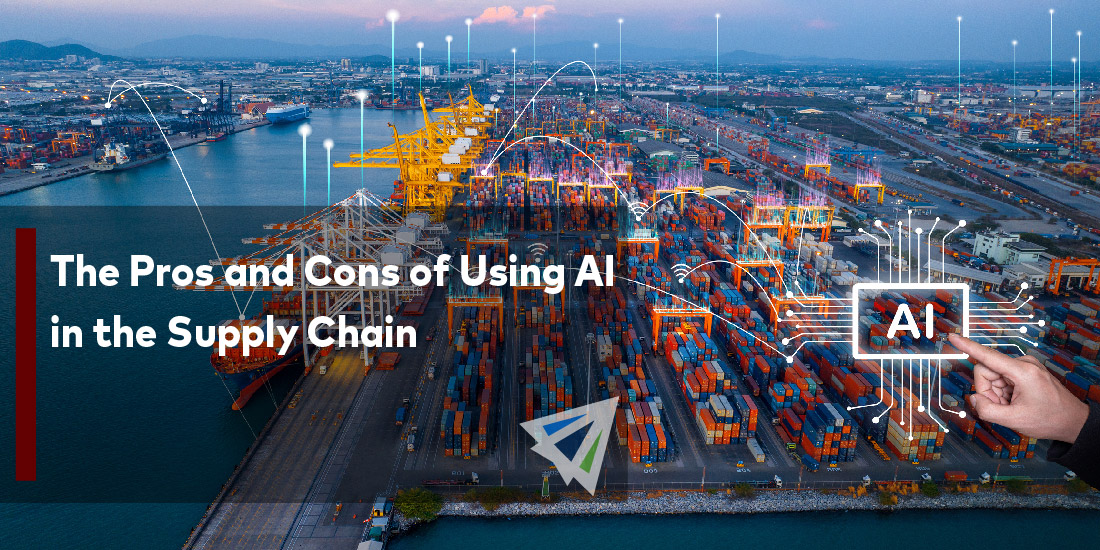Artificial intelligence (AI) integration has become a game-changing force in the fast-paced field of supply chain management. Artificial intelligence has several prospects to improve forecasting precision, optimize workflows, and strengthen decision-making procedures. But as businesses traverse the AI terrain, it’s critical to balance the benefits against any possible risks. Let’s examine the benefits and drawbacks of using AI in the supply chain sector.
Benefits of AI in Logistics Supply Chains
Enhanced prediction Capabilities: Artificial intelligence gives supply chain managers access to previously unheard-of prediction capacities. Highly accurate projections may be produced by AI-driven algorithms through the analysis of large datasets that include consumer behavior, market dynamics, and historical patterns. This makes it possible for businesses to precisely forecast changes in demand, maximize inventory levels, and reduce supply chain risks.
Real-Time Insights and Adaptability
The capacity of artificial intelligence (AI) to generate adaptability and offer real-time insights is one of the technology’s most important benefits for supply chain management. AI systems continually evaluate incoming data streams, allowing businesses to quickly adapt to shifting customer preferences, unanticipated disruptions, and shifting market conditions. Businesses are able to stay ahead of the curve because to this real-time adaptation, which also increases operational agility and resilience.
Automated Decision-Making
AI simplifies the supply chain ecosystem’s decision-making procedures. Artificial Intelligence (AI) liberates valuable human resources to concentrate on strategic objectives by automating repetitive processes like inventory restocking, demand forecasting, and logistics optimization. This automated decision-making reduces mistakes, boosts overall productivity, and expedites operational efficiency.
Scalability and Efficiency
AI-driven systems provide unmatched benefits in terms of both scalability and efficiency. AI is able to adapt to changing business demands with ease, whether it is in charge of a worldwide supply chain network or a small-scale operation. Through the utilization of AI-driven solutions for demand forecasting, route optimization, and warehouse management, enterprises may optimize workflows, curtail expenses, and foster enduring expansion.
Drawbacks of Artificial Intelligence in Logistics
While there are loads of reasons that utilizing AI throughout the supply chain can be hugely beneficial, there are also plenty of pitfalls and obstacles that businesses may run into as they attempt to shift their company processes to integrate and rely on AI to carry out tasks. Here are a few of the primary drawbacks of using artificial intelligence in logistics and supply chain:
Challenges with Data Quality and Integration
Artificial Intelligence (AI) is only as good as the data it uses. Organizations have enormous problems in integrating different data sources and guaranteeing data quality. The effectiveness of AI-driven solutions can be undermined by imprecise or lacking data, which can result in inaccurate projections and less-than-ideal decisions.
Over-reliance on previous Data
To create predictions, AI models mostly use previous data. This dependence on historical patterns, nevertheless, could not be sufficient in situations with extraordinary occurrences or abrupt changes in the market. Companies need to be careful not to rely too much on past performance and make sure they have systems in place to deal with unexpected situations.
Absence of Human Expertise and Interpretation
Although AI is very good at data processing, it is not human at making complex decisions or interpreting context. In order to navigate the intricate dynamics of supply chains, spot subtle trends, and make strategic decisions based on qualitative insights that AI could miss, human knowledge is still vital.
Costs and Complexity of Implementation
There are significant up-front expenses and complexity associated with implementing AI-driven solutions inside the supply chain ecosystem. The process of implementing new technology may be intimidating for many firms, especially smaller ones with tighter budgets, as it involves everything from purchasing IT infrastructure to educating staff and fighting organizational resistance.
In summary
In conclusion, supply chain management might undergo a significant transformation if artificial intelligence is included. Artificial intelligence (AI) provides a multitude of advantages that can lead to operational excellence and competitive advantage, ranging from improved predictive skills to real-time flexibility and automated decision-making. Organizations must exercise caution while navigating the issues of data quality, dependence on historical data, integration of human skills, and implementation costs. Businesses can fully utilize AI to properly traverse the intricacies of the contemporary supply chain landscape by finding a balance between utilizing AI’s strengths and resolving its limits.
Should you have any questions regarding this and how it could impact your shipments, please reach out to our team today.
Additionally, we have our weekly market updates that can provide you with relevant freight news, updates, developments across the industry, and more.

